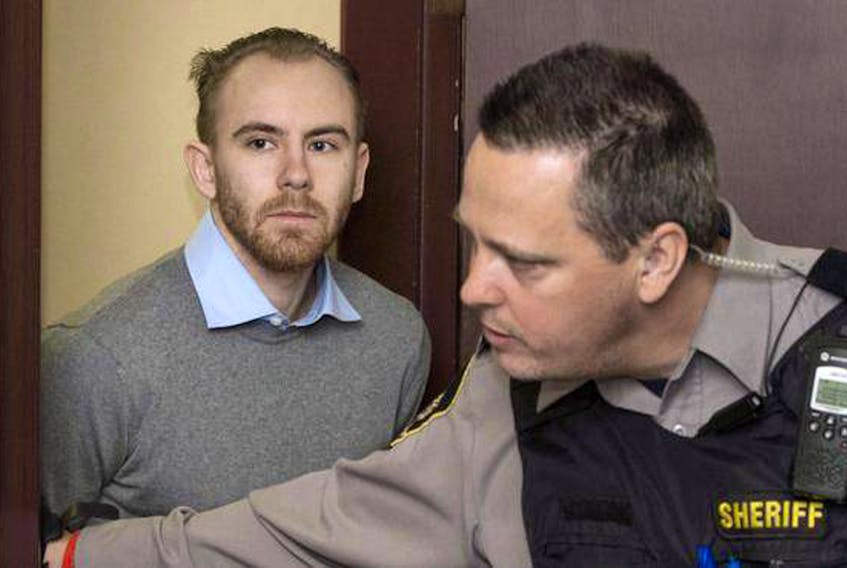A panel of three judges reserved their decision Tuesday afternoon after two days of submissions in the appeal of William Sandeson's first-degree murder conviction.
Crown attorney Jennifer MacLellan told Justices David Farrar, Jamie Saunders and Edward Scanlan on Tuesday morning that a trial judge had correctly determined that police were justified in searching Sandeson's apartment without first getting a warrant.
Sandeson, 27, was found guilty in 2017 of killing Taylor Samson while the Dalhousie University student was sitting at the kitchen table in Sandeson's apartment in 2015. Sandeson, himself a medical student at Dalhousie at the time, arranged to pay $40,000 for about nine kilograms of pot but shot Samson in the back of the head and took the drugs, the trial heard.
Ian Smith, Sandeson's lawyer, presented four grounds for appeal during his submissions on Monday, including that the warrantless search was unjustified and any evidence resulting from it should have been declared inadmissible. He is seeking a new trial for his client.
But MacLellan argued Tuesday that Justice Josh Arnold, who presided over the original 2017 trial, wrote in his decision that the police had exigent circumstances to conduct the search because they believed Samson had been kidnapped and was in imminent and urgent physical danger.
Police knew through text messages they obtained that Samson was in contact with Sandeson, that they had set up a drug deal, and that Samson went to Sandeson's apartment. They also knew that it was a large transaction and that Samson had been reported missing.
They believed Samson was the victim of a drug rip-off, which police have said was common and often involved kidnapping, assault and torture, MacLellan said.
Smith had also framed the first ground of his appeal on the fact that Bruce Webb, a private investigator hired by the defence, had gone to police after he interviewed Sandeson's neighbours Justin Blades and Pookiel McCabe and found that they had heard a loud bang and saw a bleeding man in the apartment, contrary to what they had first told police. Webb asked police and the Crown to keep his involvement secret and continued to work with the defence until his actions were revealed during the trial. Smith said that act of a “traitor” within the defence team compromised litigation privilege and deeply affected the defence's strategy.
MacLellan had started her rebuttal of that late Monday and picked it up again Tuesday morning. She argued that Webb, as an investigator, did not betray any privilege, unlike a similar hypothetical situation if a lawyer had done the same to a client. But the panel members questioned her extensively on whether even revealing the fact that the defence interviewed the pair at all compromised the possibility of a fair trial.
The Crown attorney insisted it did not, citing Justice Arnold's ruling in the case, in which he decided there was a minor breach in delayed disclosure of information but that its effect was not significant.
She pointed out that Arnold offered the defence an adjournment or more time to investigate their options, including whether they wanted to seek a stay or exclusion of evidence, but they declined.
“If they mustered a mistrial motion, they could have mustered a stay application or an exclusion application,” she said.
In his rebuttal Tuesday afternoon, Smith said even if there was no privilege violation, what Webb and the police did in this arrangement was “outrageous.”
The remedy for the situation would be available to a new judge at a new trial, Smith said. That would be to exclude all of the evidence from Blades and McCabe.
MacLellan also countered Smith's third proffered ground of appeal, that during a second interview with the police, Sandeson should have been advised that he was now a suspect in a homicide instead of kidnapping and trafficking, the charges he was originally arrested for.
MacLellan said the officer conducting the interview didn't know that Samson was dead and was using a questioning technique where you offer the subject the minimum question – related to what you do know – and maximum options – that something more serious had happened – to pressure him into confessing.
She said it was only after Sandeson told the interviewer that Samson had been shot in the head that his jeopardy changed, according to the trial judge's ruling, because it put together his knowledge of death with police suspicions. And, she pointed out, Justice Arnold did not allow anything else from after that point in the interview to be used at trial.
On Smith's fourth ground of appeal, that the verdict of first-degree murder was unreasonable given that several alternatives of what might have occurred in the kitchen were possible and there was no evidence of pre-planning of the killing, MacLellan disagreed wholeheartedly.
She said police had texts that showed Sandeson told Samson he was going to Truro to get the $40,000, when in fact he did not. This lie showed he was luring Samson, she said. Also, she said, evidence indicated Samson was in the apartment for just three minutes before he was shot, and that blood splatter analysis indicated he was shot from close range, in the back of the head, while he was seated at the kitchen table, inconsistent to the idea of a robbery gone bad.
The panel could take several months before issuing its decision.









